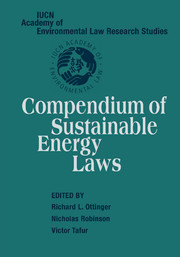Book contents
- Frontmatter
- Contents
- Acknowledgments
- Introduction
- I WORLD ENERGY ASSESSMENT
- II INTERNATIONAL AGREEMENTS
- United Nations Conference on Environment and Development: Framework Convention on Climate Change
- Kyoto Protocol to the United Nations Framework Convention on Climate Change
- Convention on the Organisation for Economic Co-Operation and Development
- Decision of the Council Establishing an International Energy Agency of the Organisation
- Agreement on an International Energy Program (IEP)
- III INTERNATIONAL LAW DECLARATIONS AND OTHER SOFT LAW INSTRUMENTS
- IV ACTION PLANS AND MULTILATERAL OPERATION RECOMMENDATIONS
- V SELECT REGIONAL INTERNATIONAL ENERGY AGREEMENTS
- VI SELECT NATIONAL LEGISLATION ILLUSTRATIVE OF SUSTAINABLE ENERGY LAW INNOVATIONS
- Index
Agreement on an International Energy Program (IEP)
Published online by Cambridge University Press: 03 May 2010
- Frontmatter
- Contents
- Acknowledgments
- Introduction
- I WORLD ENERGY ASSESSMENT
- II INTERNATIONAL AGREEMENTS
- United Nations Conference on Environment and Development: Framework Convention on Climate Change
- Kyoto Protocol to the United Nations Framework Convention on Climate Change
- Convention on the Organisation for Economic Co-Operation and Development
- Decision of the Council Establishing an International Energy Agency of the Organisation
- Agreement on an International Energy Program (IEP)
- III INTERNATIONAL LAW DECLARATIONS AND OTHER SOFT LAW INSTRUMENTS
- IV ACTION PLANS AND MULTILATERAL OPERATION RECOMMENDATIONS
- V SELECT REGIONAL INTERNATIONAL ENERGY AGREEMENTS
- VI SELECT NATIONAL LEGISLATION ILLUSTRATIVE OF SUSTAINABLE ENERGY LAW INNOVATIONS
- Index
Summary
the governments of the republic of austria, the kingdom of belgium, canada, the kingdom of denmark, the federal republic of germany, ireland, the italian republic, japan, the grand duchy of luxembourg, the kingdom of the netherlands, spain, the kingdom of sweden, the swiss confederation, the republic of turkey, the united kingdom of great britain and northern ireland, and the united states of america,
desiring to promote secure oil supplies on reasonable and equitable terms,
determined to take common effective measures to meet oil supply emergencies by developing an emergency self-sufficiency in oil supplies, restraining demand and allocating available oil among their countries on an equitable basis,
desiring to promote co-operative relations with oil producing countries and with other oil consuming countries, including those of the developing world, through a purposeful dialogue, as well as through other forms of co-operation, to further the opportunities for a better understanding between consumer and producer countries,
mindful of the interests of other oil consuming countries, including those of the developing world,
desiring to play a more active role in relation to the oil industry by establishing a comprehensive international information system and a permanent framework for consultation with oil companies,
[…]
- Type
- Chapter
- Information
- Compendium of Sustainable Energy Laws , pp. 63 - 80Publisher: Cambridge University PressPrint publication year: 2005

